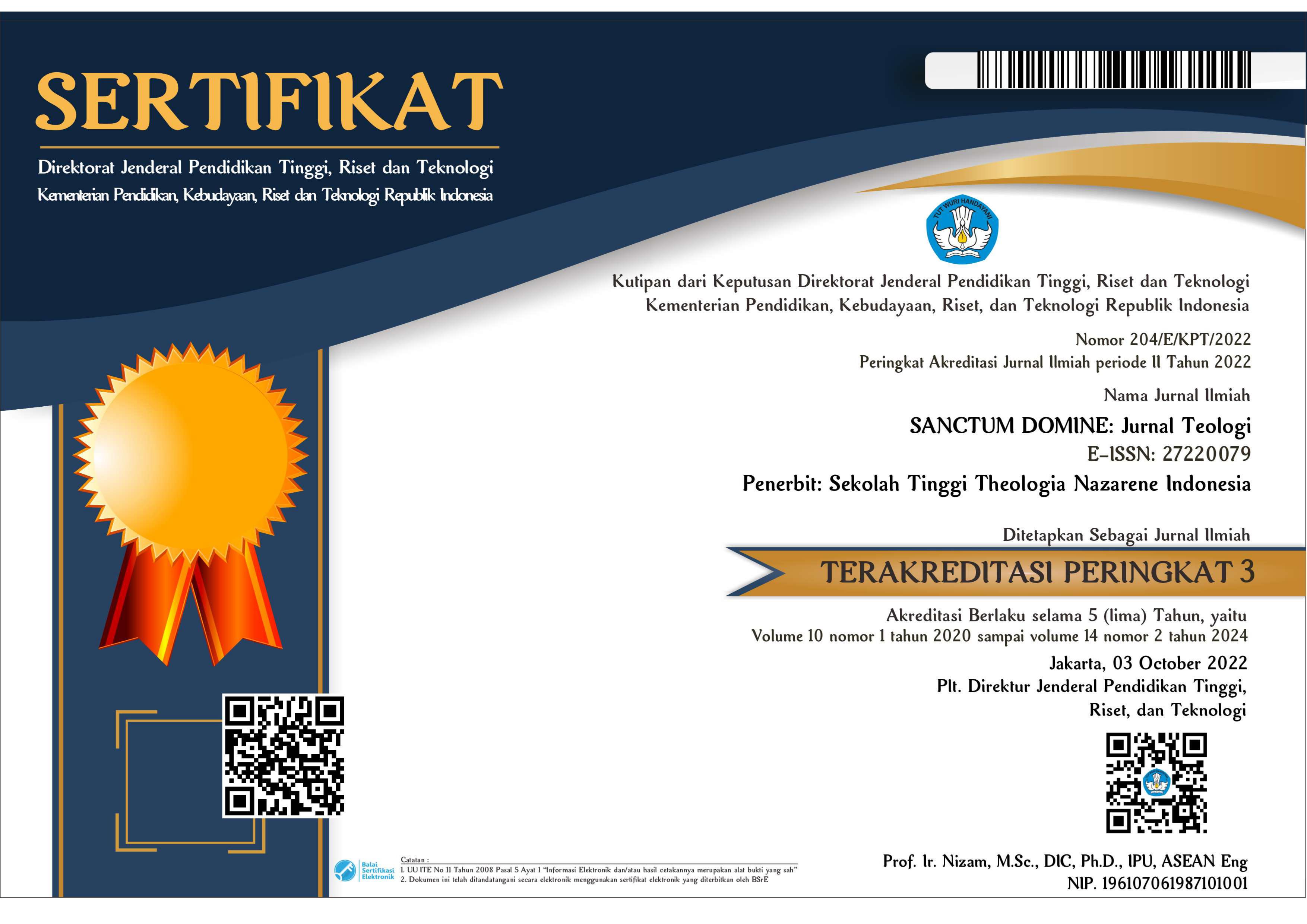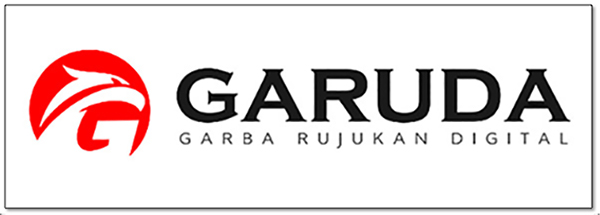Developing a Research Culture with integrity
The Effectiveness of Utilizing the Educational Research Methodology Module with a Biblical Christian Insight for Students
Abstract
Methods in educational research in UPH Teachers College is a course that prepares Teachers College students to be thinkers, researchers, and competent writers based on a biblical Christian worldview. The gap the researchers came across was a need for this course to be integrated with the biblical Christian worldview to develop research with integrity. The researchers then designed a module that was used in methodology class, and the method used is a descriptive qualitative, involving 110 students from 4 majors who took this course in the odd semester of 2021. This research's purpose is to elaborate on the usage of this module which is significant in helping the students to comprehend the biblical Christian worldview. The research results show that 96.36% of the students stated that the module equipped them to have a biblical Christian worldview for doing research. The results of the usage of modules show that students can conduct research based on a Christian worldview with integrity. Things for future improvement are the feedback and motivational words, attention to the layout by providing a navigation feature, and fun learning concepts using formal, popular, and communicative Indonesian language. A two-way dialogue style can make the module more interactive and an addition to learning videos made by the lecturers.
References
Adriani, Deni, Putri Kemala, Dewi Lubis, Muhammad Andi, and Abdillah Triono. ‘Development of Research Methodology Module Based on High Order Thinking Skill (HOTS)’. In Proceedings of the 1st Unimed International Conference on Economics Education and Social Science (UNICEES 2018), no. Unicees 2018 (2020): 367–72. https://doi.org/10.5220/0009498203670372.
Ahmad, Thomas Partono. Nurkhin. ‘The Development Of Learning Sets And Research Methodology Module Using Problem Based Learning For Accounting Education Students’. Journal of Accounting and Business Education 1, no. September (2016): 77–97.
Aryani, Ima, Universitas Muhammadiyah Surakarta, and A Pendahuluan. ‘Seminar Nasional Pendidikan Sains II UKSW 2017 Seminar Nasional Pendidikan Sains II UKSW 2017’, 2017, 41–47.
Aysyah Rengganis, Nana Harlina Haruna, Astrid Chandra Sari, Kasta Gurning Joni Wilson Sitopu, Diah Puji Nali Brata, Karwanto Ferawati Artauli Hasibuan, Dina Chamidah, and Hani Subakti Lusy Tunik Muharlisiani, Kurniawati Martha. Penelitian Dan Pengembangan. Edited by Ronal Watrianthos. 1st ed. Medan: Yayasan Kita Menulis, 2022.
Beech, Geoff Beech And Elizabeth. ‘Research As The Un-Hiding Of God’s Knowledge’. African Journal for Transformational Scholarship 3 (2016): 3–12.
Fitriana, Desi Eka Nur. ‘Penyusunan Modul Pembelajaran Berbasis Sains Teknologi Dan Masyarakat (STM) Pada Konsep Bioteknologi (Sebagai Bahan Ajar Siswa SMA Kelas XII)’. BIOSFER: Jurnal Pendidikan Biologi (BIOSFERJPB) 10, no. 2 (2017): 60–72.
H, Matthew, and Albert Cheng. ‘The Preparation and Practice of Protestant School Leadership : Evidence from a Nationally Representative’. Journal of Research on Christian Education 30, no. 3 (2021): 244–69. https://doi.org/10.1080/10656219.2021.1986443.
Hendra, Yohanes. ‘Book Reviews To the Nations for the Earth : A Missional Spirituality , Charles J . Fensham , Toronto ’: Veritas: Jurnal Teologi Dan Pelayanan 19, no. 2 (2020): 229–34.
Kusumawati, Debi Debora. ‘Aspek-Aspek Dalam Menyusun Bahan Ajar Komsel : Suatu Usulan Bagi Gereja Penyebaran Injil Majalengka’. Sanctum Domine: Jurnal Teologi 11, no. 1 (2021): 19–36.
Martha, Kurniawati, S Si, and M Pd. ‘Penerapan Backward Design Model Untuk Meningkatkan Kemampuan Literasi Mahasiswa Teachers College UPH Di Kelas Basic Science’ 10, no. 2 (2021): 55–70. https://doi.org/10.46495/sdjt.v9i1.57.
Muehlenberg, Bill. ‘J. I. Packer, Once Again You Can Never Get Enough of Jim Packer. Three New Books Written by Him or about Him.’ The Aquila Report, 2022. https://theaquilareport.com/j-i-packer-once-again/.
Sahrani, Riana. ‘Angka Plagiarisme Naik, Apa Pentingnya Jadi Mahasiswa Berintegritas?’ Kompas.com, 2020. https://www.kompas.com/edu/read/2020/12/07/093751071/angka-plagiarisme-naik-apa-pentingnya-jadi-mahasiswa-berintegritas?page=all.
Septora, Rio, and Universitas Muhammadiyah Metro. ‘Pengembangan Modul Dengan Menggunakan Pndekatan Saintifik Pada Kelas X Sekolah Menengah Atas’. Jurnal Lentera Pendidikan Pusat Penelitian LPPM UM METRO 2, no. 1 (2017): 86–98.
Simanjuntak, Junihot. Filsafat Pendidikan Dan Pendidikan Kristen. Edited by Y. Daniel. 5th ed. Bandung: Andi, 2013.
Suciati. Pedoman Pengembangan Bahan Ajar Interaktif. Edited by Belawati Tian; Daryono. Tangerang Selatan: Universitas Terbuka, 2018.
Sugiyono. Metode Penelitian Pendidikan (Kuantitatif, Kualitatif, Kombinasi, R&D Dan Penelitian Tindakan). Edited by Apri Nuryanto. 3rd ed. Bandung: Alfabeta, cv, 2021.
Tegal, Kantor Kementerian Agama Kabupaten. ‘Pentingnya Penelitian Tindakan Kelas Bagi Guru’. Jnews, 2018. https://jateng.kemenag.go.id/2018/11/pentingnya-penelitian-tindakan-kelas-bagi-guru/.
UPH, Fakultas Ilmu Pendidikan- Teachers College. Pedoman Penulisan Proyek Akhir Fakultas Ilmu Pendidikan - Teachers College Universitas Pelita Harapan (2020).
Wardhani, IGAK. Penelitian Tindakan Kelas. Edited by Sayogyo. 28th ed. Tangerang Selatan: Universitas Terbuka, 2019.
Copyright (c) 2023 SANCTUM DOMINE: JURNAL TEOLOGI

This work is licensed under a Creative Commons Attribution-NonCommercial-ShareAlike 4.0 International License.
Copyright:
SANCTUM DOMINE: Jurnal Teologi will validate, produce, disseminate, and act as steward in the long-term curation of every article published. In order to achieve this, the author typically requires a transfer or “assignment” of the copyright in the article. As is the case for open access publishing, the author (or copyright owner of the article, if different) signs an author publishing agreement. The agreement incorporates the necessary transfer of copyright.
After assigning copyright, the author will still retain the right to:
- Be credited as the author of the article.
- Own and exercise any trademark or patent rights held by author and addressed in the article.
- Make printed copies of the article to use for a lecture or class that the author leading on a non-commercial basis.
- Share the article with friends, colleagues and influential people the author would like to read the work.
- Present the article at a meeting or conference and distribute printed copies of the article on a non-commercial basis.
License:
This work is licensed under a Creative Commons Attribution-NonCommercial-ShareAlike 4.0 International License.
You are free to:
- Share — copy and redistribute the material in any medium or format
- Adapt — remix, transform, and build upon the material
- The licensor cannot revoke these freedoms as long as you follow the license terms.
Under the following terms:
- Attribution — You must give appropriate credit , provide a link to the license, and indicate if changes were made . You may do so in any reasonable manner, but not in any way that suggests the licensor endorses you or your use.
- NonCommercial — You may not use the material for commercial purposes .
- ShareAlike — If you remix, transform, or build upon the material, you must distribute your contributions under the same license as the original.
- No additional restrictions — You may not apply legal terms or technological measures that legally restrict others from doing anything the license permits.
Notices:
You do not have to comply with the license for elements of the material in the public domain or where your use is permitted by an applicable exception or limitation .
No warranties are given. The license may not give you all of the permissions necessary for your intended use. For example, other rights such as publicity, privacy, or moral rights may limit how you use the material.



8.png)









